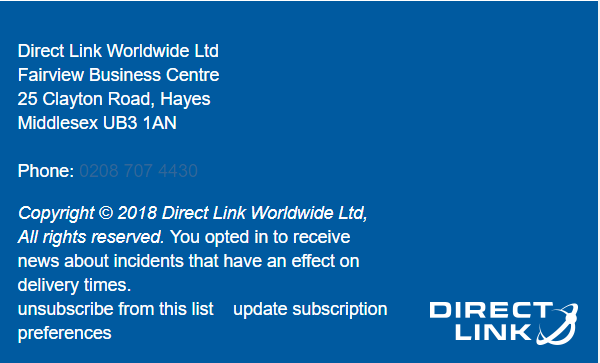
Blogs
Shipping Incident bulletin 14th October 2019

Direct Link Incident Bulletins are sent weekly with information about situations that affect postal distribution world wide. Direct Link Incident Bulletins are published here by permission from Direct Link. Thanks to Direct Link for this valuable service.
Direct Link Incident Bulletins are also available via email. Subscribe Here to get Direct Link Incident Bulletins sent to your email inbox.
This week’s bulletin contains updates about: France, Japan, Thailand, Barbados, Bermuda, Indonesia, Australia, New Zealand, Spain.
France
Start date: 7th October
End date: 8th October
Ground staff strike in Paris: it has been reported on October 6 that the Orly Flight Service ground staff has called for a 1-day strike at Paris Orly Airport, starting at 3:00 am local time on October 7. Employees strike over plans for liquidation. Associated disruptions to flight operations were likely to occur.
Start date:Â 8th October
End date: 9th October
Farmers to block highways nationwide: On October 7, media sources indicated that farmers with the FNSEA union planed to block highways and roads between 11:00 am and 2:00 pm local time on October 8. Farmers protest against the effects of free trade agreements and strengthening of environmental standards in France. Road traffic congestion and delays were likely to occur.
Japan
Start date: 12th October
End date: 13th October
Japan Post informs that Haneda (HND) and Narita (NRT) airports will be temporarily closed on Saturday, 12 October 2019 owing to Typhoon Hagibis, which is due to hit the east of Japan.  The airports will resume operations on Sunday, 13 October.
Japan Post is making every effort to maintain operational performance for international postal services as far as possible, and apologizes for unavoidable delays.
Thailand – back to normal
Start date: 5th September
End date:Â 8th October
Thailand Post informs other Union member countries and their designated operators that the situation has returned to normal following the recent flooding. Mail operations, including delivery of postal items, have resumed in all postcode areas.
Barbados
Start date: 4th October
Updated:Â 8th October
Mail processing office resumes operations: On October 8, the Barbados Postal Service reported that all postal services have resumed at the processing centre in Bridgetown, Barbados, following temporary suspension since October 4. The situation has been back to normal.
Bermuda
Start date: 18th September
Updated:Â 10th October
Postal operations normalize: On October 10, the Bermuda Post Office reported that postal services have resumed following the passage of Hurricane Humberto. Mail collection and delivery services were suspended on September 18 in anticipation of the hurricane’s arrival.
Indonesia
Start date: 18th September
Updated:Â 8th October
The designated operator of Indonesia, Pos Indonesia, informs other Union member countries and their designated operators that all postal operations are back to normal at the office of exchange in Jakarta.
Australia
Start date: 9th October
Updated:Â Ongoing
The designated operator of Australia, Australia Post, informs that a severe weather event, with bush fires in regional New South Wales, is affecting the collection and delivery of all mail products for postcode area 2469. There will also be impacts on mail flows into and out of Australia, owing to difficulties transporting the mail to and from the aforementioned area.
We’ve no indication on the length of likely delays at present, for more information please see RFS NSW website.
New Zealand
Start date: 1st December
From 1 December 2019, Goods and Services Tax (GST) will apply to sales of low value imported goods sent to consumers in New Zealand.
To ensure compliance with the New Zealand GST requirements please review the action required below:
•  If you are a supplier of B2C goods and services to New Zealand consumers and your total supplies exceed or is likely to exceed NZ$60,000 in a 12-month
period, you will need to register for, collect and return New Zealand GST on
those sales.
•  If you are under the $60,000 threshold for B2C goods and services, no action will be required. However, you are required to keep track of your sales and take appropriate action should your sales exceed the current threshold.
Please note that this letter is intended as a guide only. It does not contain all the
information you may need to comply with your obligations. You should seek
independent advice if you are unsure.
The current GST collection process for goods New Zealand Customs collect 15% GST and tariff duty on imported items, including anything bought from overseas, where the total amount of duty and GST on the purchase equals NZ$60 or more. We call goods that do not have GST and duties collected on them ‘low-value imported goods.
What’s changing from 1 December 2019
From 1 December, the definition of ‘low-value imported goods’ is changing. Items bought from overseas and individually valued at NZ$1,000 or less will be considered low-value imported goods. If the supplier of those goods meets the sales threshold for B2C shipments, GST must be collected by the overseas supplier on low-value imported goods at the point of sale.
GST must also be charged on services related to the sale of low-value imported goods including (but not limited to) international transportation and insurance.
The legislation requires overseas businesses, online marketplaces and re deliverers supplying goods or services to New Zealand consumers with sales exceeding NZ$60,000 in a 12-month period to:
•  update their business systems so they can collect and return GST;
•  register for GST in New Zealand;
•  collect GST on each good valued at NZ$1,000 or less, sold to consumers and delivered to addresses in New Zealand;
•  provide the consumer with a receipt that clearly shows the amount of GST charged;
•  complete relevant documentation to facilitate the border clearance of your goods;
We note that there is no current requirement to include the GST number, or to indicate whether GST has been paid, on the CN 22/23. Suppliers are advised, however, that it is a legal requirement to provide the receiver with a receipt which clearly notes your GST number and indicates whether GST has been paid.
We recommend that you include a receipt and/or commercial invoice with each
consignment. Border agencies may use the documentation enclosed with a consignment to assess liability at the border. Where GST has been paid and no
documentation is available to evidence that payment, New Zealand Customs may charge the consumer GST before completing importation. The consumer will then need to seek a refund of the initial GST paid from the offshore supplier. For this reason, the inclusion of a receipt or commercial invoice will help to prevent double taxation.
Refer to sections 193 – 214 of the IRD Special Report regarding tax receipt
requirements.
•  return that GST to New Zealand Inland Revenue.
The Inland Revenue Department has published further guidance on its website,
http://ird.govt.nz/GSTUpdate. This contains multiple FAQs and factsheets which we advise you review in detail, to ensure you meet the requirements.
Technical problems
Spain
Start date: 11th October
Updated:Â 12th October
IT systems update to cause postal disruption: Correos informs that its postal operations have been affected from 11:30 pm local time on October 11 until 7 am local time on October 12 due to an update of IT systems. Dispatches of all mail items, as well as transmission of EDI messages, have been suspended for the above period.

